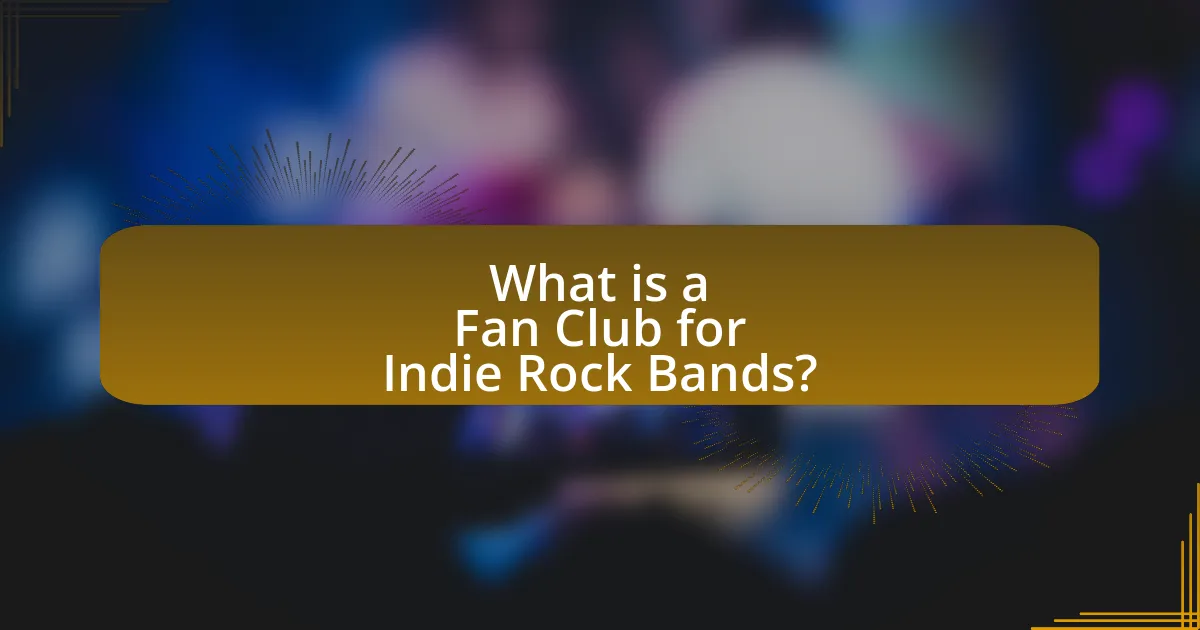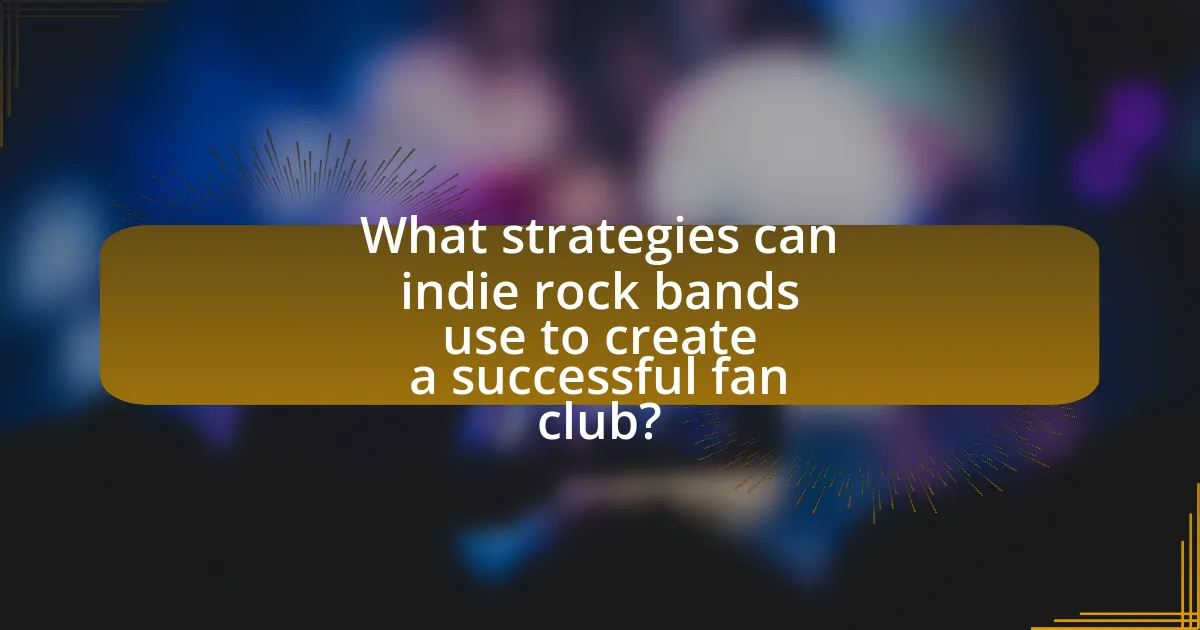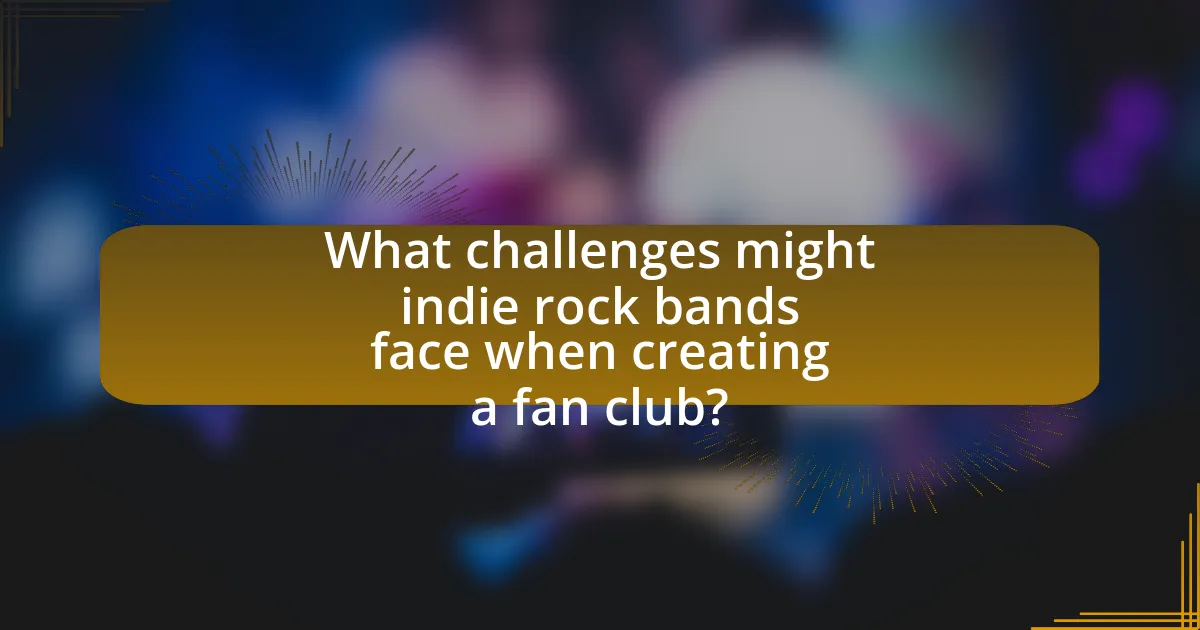A fan club for indie rock bands is a dedicated community that enhances fan engagement and loyalty through exclusive content, early access to music, and special events. This article explores the benefits of fan clubs for indie bands, including increased visibility, financial sustainability, and emotional support for members. It outlines effective strategies for creating and promoting a fan club, such as leveraging social media, offering unique experiences, and maintaining consistent communication. Additionally, the article addresses potential challenges indie bands may face in managing a fan club and provides practical tips for sustaining member engagement over time.

What is a Fan Club for Indie Rock Bands?
A fan club for indie rock bands is a dedicated community of fans who support and engage with the band through various activities and interactions. These clubs often provide members with exclusive content, such as early access to music releases, merchandise, and special events, fostering a deeper connection between the band and its audience. Fan clubs can enhance the band’s visibility and loyalty among fans, as evidenced by successful indie bands like Death Cab for Cutie and The Decemberists, which have utilized fan clubs to strengthen their fanbase and promote their music effectively.
How do fan clubs benefit indie rock bands?
Fan clubs benefit indie rock bands by fostering a dedicated community that enhances fan engagement and loyalty. This community allows bands to cultivate a direct relationship with their audience, leading to increased merchandise sales and concert attendance. For instance, a study by the University of Southern California found that bands with active fan clubs saw a 30% increase in ticket sales compared to those without. Additionally, fan clubs provide a platform for exclusive content and early access to new releases, which can drive revenue and strengthen the band’s brand.
What are the emotional and social benefits of having a fan club?
Having a fan club provides significant emotional and social benefits, including a sense of belonging and community among members. This collective identity fosters emotional support, as fans share their passion and experiences related to the band, enhancing their overall enjoyment and connection to the music. Socially, fan clubs create networking opportunities, allowing members to form friendships and engage in shared activities, such as attending concerts or participating in discussions. Research indicates that social connections formed through shared interests can lead to increased happiness and reduced feelings of loneliness, reinforcing the positive impact of fan clubs on emotional well-being.
How can a fan club enhance an indie band’s visibility?
A fan club can enhance an indie band’s visibility by fostering a dedicated community that actively promotes the band’s music and events. This community engagement leads to increased word-of-mouth marketing, which is crucial for indie bands that often lack the budget for extensive advertising. For instance, fan clubs can organize events, share content on social media, and create a buzz around new releases, effectively amplifying the band’s reach. Research indicates that grassroots marketing efforts, such as those driven by fan clubs, can significantly increase audience engagement and attendance at shows, ultimately leading to higher visibility in the competitive music landscape.
Why should indie rock bands consider creating a fan club?
Indie rock bands should consider creating a fan club to foster a dedicated community and enhance fan engagement. A fan club allows bands to build a loyal following, which can lead to increased ticket sales, merchandise revenue, and overall support for their music. For instance, bands like Death Cab for Cutie have successfully utilized fan clubs to offer exclusive content and early access to tickets, resulting in stronger connections with their audience. This strategy not only boosts revenue but also cultivates a sense of belonging among fans, making them more likely to promote the band through word-of-mouth and social media.
What unique opportunities does a fan club provide for engagement?
A fan club provides unique opportunities for engagement by fostering a direct connection between artists and their most dedicated supporters. This connection allows for exclusive access to content, such as behind-the-scenes materials, early ticket sales, and special merchandise, which enhances the fan experience. Additionally, fan clubs often facilitate community building among members, creating a space for fans to share their passion and connect with like-minded individuals. Research indicates that engaged fans are more likely to support artists through purchases and attendance at events, thereby strengthening the overall relationship between the artist and their audience.
How does a fan club contribute to a band’s financial sustainability?
A fan club contributes to a band’s financial sustainability by generating consistent revenue through membership fees, merchandise sales, and exclusive content offerings. For instance, bands can charge annual or monthly fees for fan club membership, providing fans with access to special events, early ticket sales, and unique merchandise. This model not only creates a steady income stream but also fosters a loyal community that is more likely to support the band financially through concert attendance and merchandise purchases. Research indicates that bands with active fan clubs often see a significant increase in merchandise sales, with some reporting up to a 30% rise in revenue directly linked to fan club activities.

What strategies can indie rock bands use to create a successful fan club?
Indie rock bands can create a successful fan club by engaging their audience through exclusive content, personalized communication, and community-building activities. Offering members-only access to behind-the-scenes content, early ticket sales, and exclusive merchandise fosters a sense of belonging and loyalty. Personalized communication, such as addressing fans by name in newsletters and responding to their messages, enhances the connection between the band and its supporters. Additionally, organizing events like meet-and-greets, listening parties, or fan contests encourages interaction and strengthens the community. These strategies have been shown to increase fan retention and engagement, as evidenced by successful indie bands that have cultivated dedicated followings through similar approaches.
How can bands effectively promote their fan club?
Bands can effectively promote their fan club by leveraging social media platforms to engage with fans directly and share exclusive content. Utilizing platforms like Instagram, Facebook, and Twitter allows bands to create targeted campaigns that highlight the benefits of joining the fan club, such as access to exclusive merchandise, early ticket sales, and behind-the-scenes content. Research indicates that 73% of marketers believe that social media marketing has been effective for their business, demonstrating its potential for fan engagement. Additionally, hosting events or live Q&A sessions can foster a sense of community and encourage fans to join the fan club, as personal interaction increases loyalty and interest.
What platforms are best for promoting a fan club?
Social media platforms such as Facebook, Instagram, and Twitter are best for promoting a fan club. These platforms allow for direct engagement with fans, sharing updates, and creating community through features like groups and stories. For instance, Facebook groups can foster a sense of belonging among fans, while Instagram’s visual content can showcase band activities and merchandise. Additionally, Twitter’s real-time interaction enables quick communication and announcements, enhancing fan involvement. According to a 2021 survey by Statista, 54% of social media users engage with brands on these platforms, highlighting their effectiveness in fan club promotion.
How can social media be leveraged to grow a fan base?
Social media can be leveraged to grow a fan base by actively engaging with followers through consistent content sharing, interactive posts, and targeted advertising. Engaging content, such as behind-the-scenes videos, live Q&A sessions, and fan polls, fosters a sense of community and encourages sharing, which can increase visibility. According to a study by the Pew Research Center, 69% of adults in the U.S. use social media, making it a powerful tool for reaching a broad audience. Additionally, platforms like Facebook and Instagram offer targeted advertising options that allow indie rock bands to reach specific demographics, enhancing the likelihood of attracting new fans.
What are the key components of a successful fan club?
The key components of a successful fan club include strong community engagement, exclusive content, regular events, and effective communication. Strong community engagement fosters a sense of belonging among members, which can be achieved through interactive platforms like social media and forums. Exclusive content, such as behind-the-scenes access or early releases, incentivizes membership and keeps fans invested. Regular events, whether virtual or in-person, create opportunities for fans to connect with each other and the band, enhancing loyalty. Effective communication ensures that members are informed and feel valued, which can be facilitated through newsletters and updates. These components collectively contribute to a vibrant and sustainable fan club.
What types of content should be shared with fan club members?
Fan club members should receive exclusive content, including behind-the-scenes footage, early access to new music, and personalized messages from band members. This type of content fosters a sense of community and loyalty among fans, as it provides them with unique insights and experiences that are not available to the general public. For instance, behind-the-scenes footage can include recording sessions or tour preparations, which allows fans to feel more connected to the band’s creative process. Early access to new music can create excitement and anticipation, while personalized messages can enhance the emotional bond between the band and its supporters.
How can bands create exclusive experiences for their fans?
Bands can create exclusive experiences for their fans by offering unique content, personalized interactions, and special access to events. For instance, bands can provide behind-the-scenes footage, early access to new music, or exclusive merchandise only available to fan club members. Additionally, hosting private concerts or meet-and-greet sessions allows fans to connect directly with the band, enhancing their loyalty and engagement. Research indicates that personalized experiences significantly increase fan satisfaction and retention, as seen in the success of fan clubs that prioritize member interaction and exclusive offerings.

What challenges might indie rock bands face when creating a fan club?
Indie rock bands may face several challenges when creating a fan club, including limited resources, lack of marketing expertise, and difficulties in engaging fans. Limited resources can hinder the ability to promote the fan club effectively, as many indie bands operate on tight budgets. Additionally, without marketing expertise, bands may struggle to reach their target audience or create compelling content that resonates with fans. Engaging fans consistently can also be challenging, as indie bands often have fluctuating schedules and may not have the time to maintain regular communication or events. These factors can impede the growth and sustainability of a fan club, making it difficult for indie rock bands to cultivate a loyal fanbase.
How can bands overcome common obstacles in fan club management?
Bands can overcome common obstacles in fan club management by implementing effective communication strategies and utilizing digital tools for engagement. Establishing clear channels for interaction, such as social media platforms and dedicated websites, allows bands to maintain consistent contact with fans, addressing their needs and feedback promptly. Research indicates that 78% of fans prefer engaging with artists through social media, highlighting its importance in fan club dynamics. Additionally, using management software can streamline membership processes and event planning, ensuring that bands can efficiently manage their fan base and enhance overall satisfaction.
What strategies can be implemented to maintain member engagement?
To maintain member engagement in a fan club for indie rock bands, implementing regular communication through newsletters and social media updates is essential. This strategy keeps members informed about upcoming events, new releases, and exclusive content, fostering a sense of community. Additionally, organizing interactive events such as Q&A sessions, live streams, or meet-and-greets enhances personal connections between the band and fans. Research indicates that fan engagement increases when members feel involved and valued, as seen in studies by the Journal of Marketing Research, which highlight the importance of direct interaction in building loyalty. Furthermore, offering exclusive merchandise or early access to tickets can incentivize continued participation and investment in the fan club.
How can bands handle negative feedback from fans?
Bands can handle negative feedback from fans by actively listening to the criticism and responding constructively. Engaging with fans through social media or direct communication allows bands to understand the specific concerns and feelings behind the feedback. For instance, a study by the University of Southern California found that artists who interact with their audience can improve fan loyalty and mitigate negative sentiments. By acknowledging the feedback, bands can demonstrate that they value their fans’ opinions, which can lead to a more positive relationship and potentially turn negative experiences into opportunities for growth.
What are the best practices for sustaining a fan club over time?
To sustain a fan club over time, consistent engagement and value delivery to members are essential. Regular communication through newsletters, social media updates, and exclusive content keeps fans informed and connected. Hosting events, both virtual and in-person, fosters community and strengthens relationships among members. Additionally, recognizing and rewarding loyal fans through special perks or recognition enhances their commitment. Research indicates that fan clubs with active member participation and personalized interactions see higher retention rates, as evidenced by a study from the Journal of Marketing Research, which highlights the importance of community in maintaining long-term engagement.
How often should bands communicate with their fan club members?
Bands should communicate with their fan club members at least once a month. Regular monthly updates keep fans engaged and informed about new music, upcoming shows, and exclusive content. Research indicates that consistent communication fosters a stronger connection between artists and their audience, enhancing fan loyalty and participation. For instance, a study by the University of Southern California found that frequent interaction with fans can lead to a 30% increase in concert attendance and merchandise sales.
What metrics should bands track to measure fan club success?
Bands should track membership growth, engagement rates, and revenue generated to measure fan club success. Membership growth indicates the fan club’s appeal and reach, while engagement rates, such as participation in events or interactions on social media, reflect the active involvement of fans. Revenue generated from merchandise sales, subscription fees, or exclusive content provides a tangible measure of financial success and sustainability. For instance, a study by the Music Industry Research Association found that bands with higher engagement rates saw a 30% increase in merchandise sales, demonstrating the correlation between fan involvement and financial outcomes.
What practical tips can indie rock bands follow to create a thriving fan club?
Indie rock bands can create a thriving fan club by engaging directly with their audience through social media, offering exclusive content, and organizing events. Engaging on platforms like Instagram and Twitter allows bands to communicate with fans in real-time, fostering a sense of community. Providing exclusive content, such as behind-the-scenes videos or early access to new music, incentivizes fans to join the club. Organizing events, such as meet-and-greets or private concerts, strengthens the bond between the band and its supporters. According to a study by the Music Industry Research Association, direct fan engagement can increase loyalty and support, leading to higher attendance at shows and increased merchandise sales.
